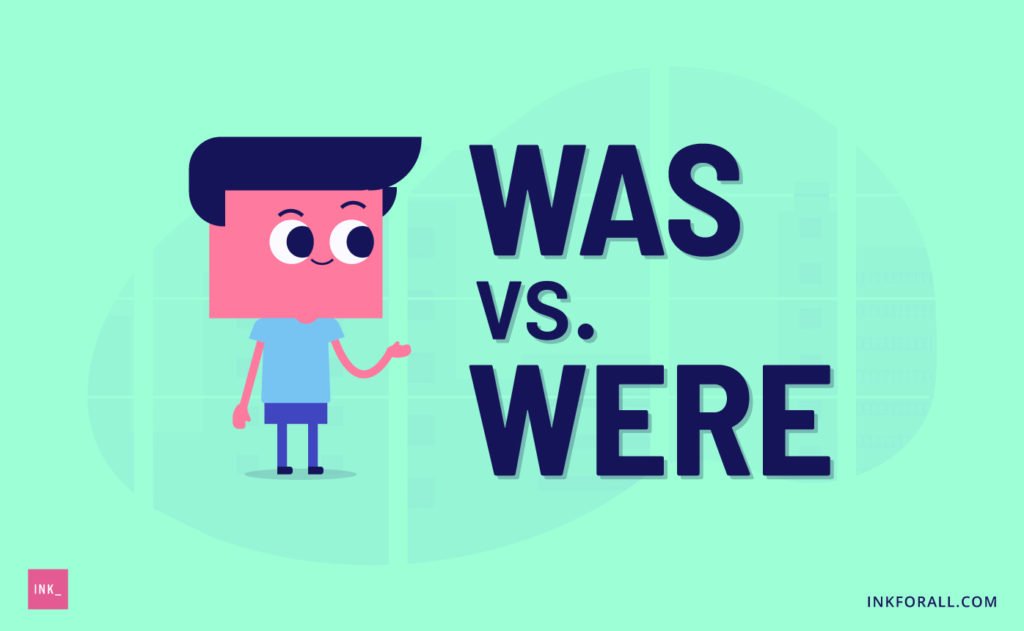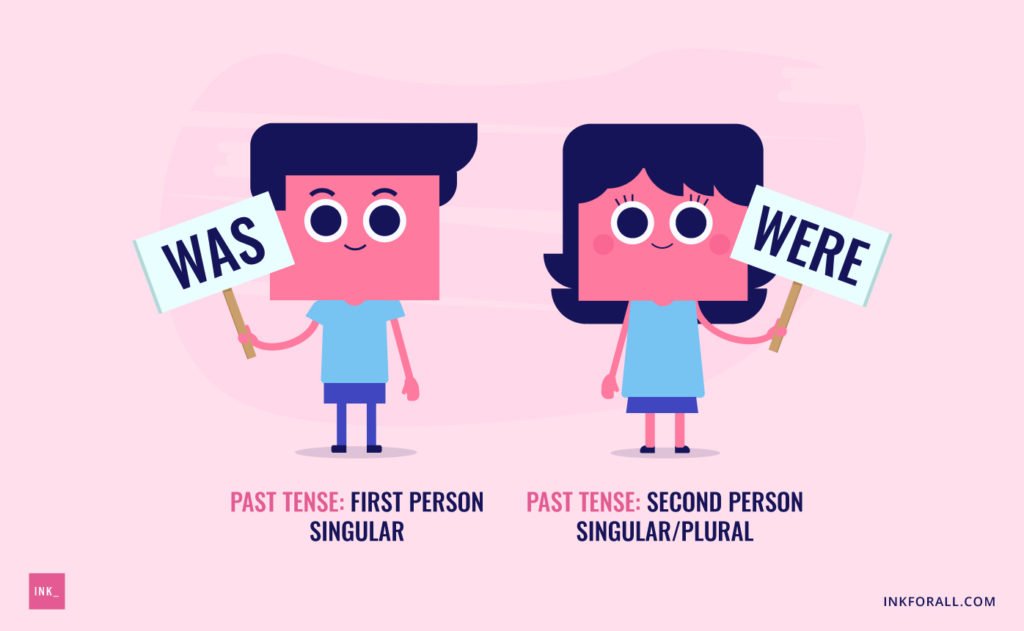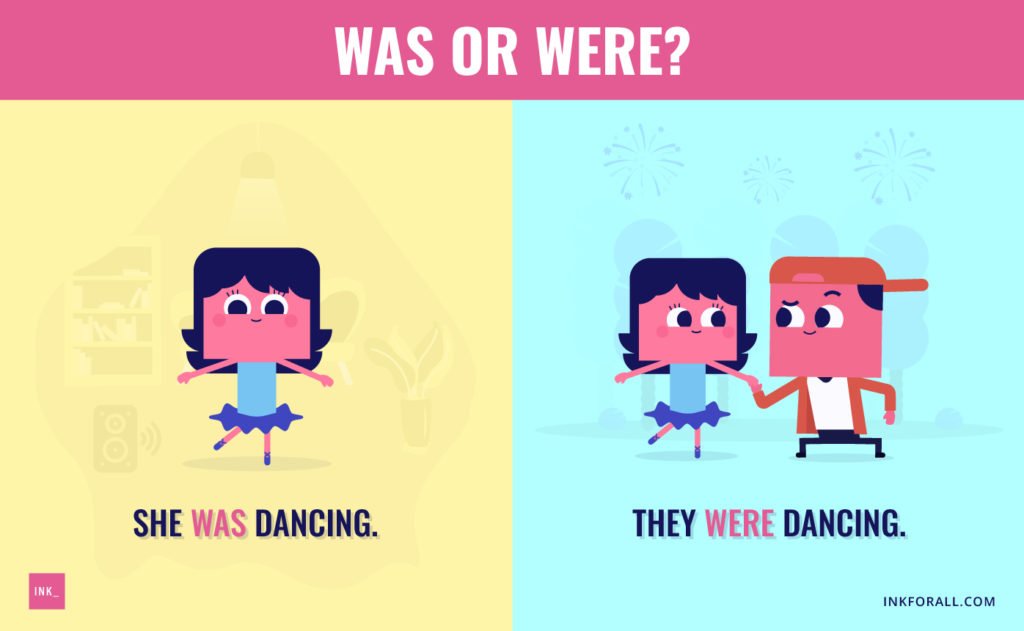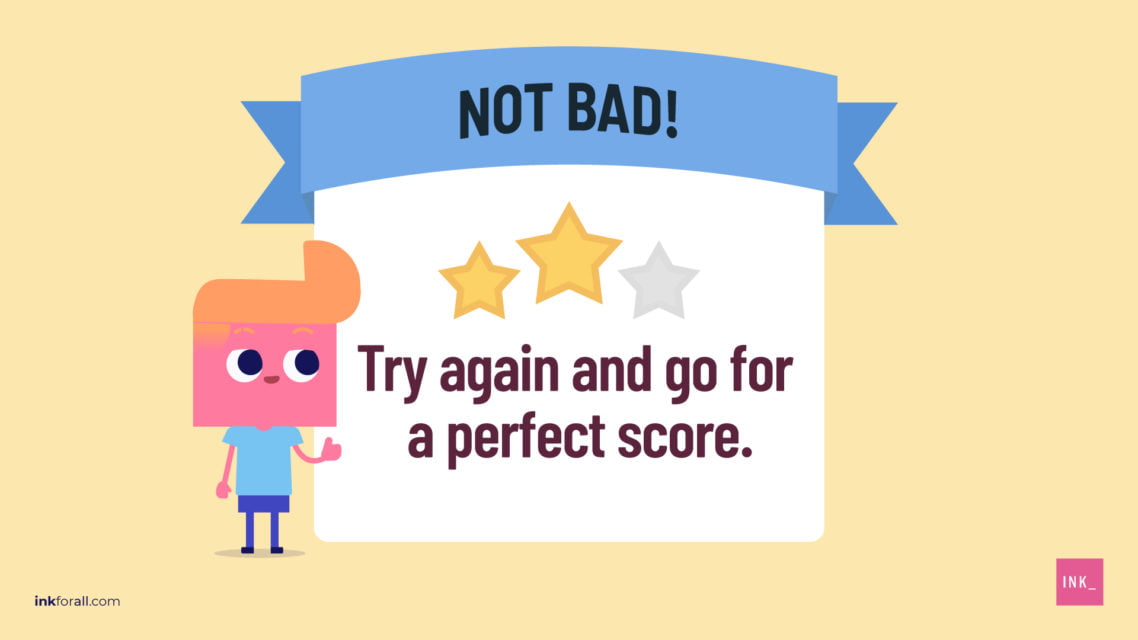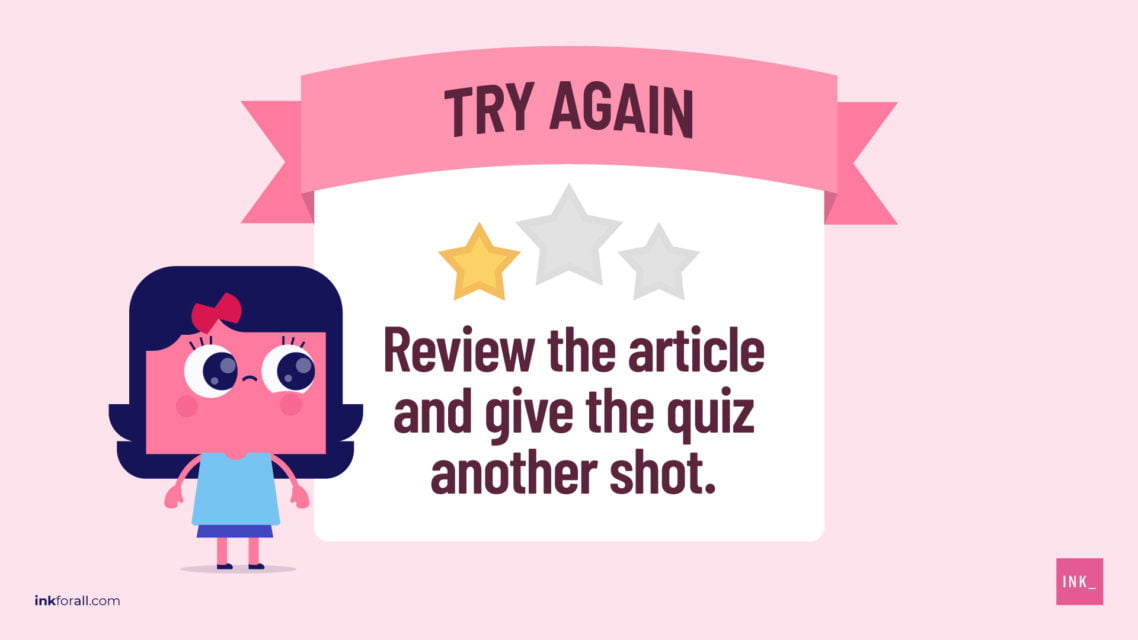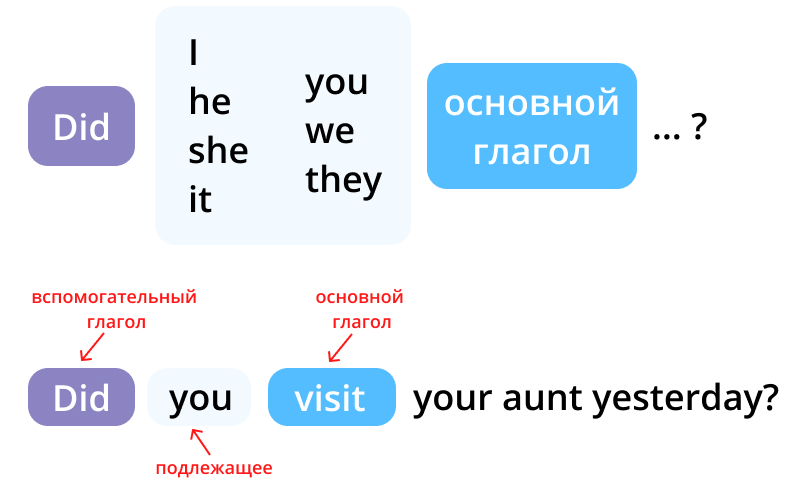Both was and were are correct forms of the verb “to be.” However, when to use was vs. were depends on whether you’re talking about something imaginary or something real.
Hypothetical situations need the subjunctive mood, so you should use were regardless of the speaker’s point of view. However, situations that actually happened in the past need the indicative mood. This means subject-verb agreement comes into play, so you should use was with I/he/she (She was here) but were with you/we/they (You/we/they were here).
When to Use Was vs. Were at a Glance:
Should you use was or were? This is a grammar question that even native English speakers struggle to answer correctly. Let’s look at the easiest way to know the difference between was and were. What’s more, you’ll see was vs. were example sentences and learn how to correctly use this irregular verb.
| Indicative Mood: Past tense of the verb “to be” | I was | you were | he was | she was | it was | we were | you were | they were |
| Subjunctive Mood: Hypothetical situations with the verb “to be” | I were | you were | he were | she were | it were | we were | you were | they were |
In this way, the difference between was and were comes down to describing something that actually happened in the past vs. an imaginary situation that never happened at all. Moreover, it also depends on who is speaking. Finally, subject-verb agreement also comes into play.
3 Easy Steps That Tell you When to use Was vs. Were
1. Ask yourself these questions:
- Did it really occur in the past?
- Or, are we talking about an imaginary situation that can’t be real?
2. If it actually occurred in the past:
Use was with the first and third person singular points of view:
- I was
- She was
- He was
- It was
- You were
But, use were with the second person (you) or third person (they) plural points of view. This helps ensure correct subject-verb agreement.
- You were
- They were
3. If the situation is imaginary and can’t be real:
Were is the only correct option. As such, use were for every point of view.
Why Second Conditional Uses Were?
A second conditional, or type 2 conditional sentence, describes hypothetical or imaginary situations, like dreams and wishes. In some instances, those situations could happen in the future, but they most likely won’t.
Below is the structure for a second conditional statement:
If + verb to be + condition
In the statement above, we used “were” instead of “was.” That’s even if the latter is considered the proper past simple form of the verb to be to go with the pronoun “I.”
We do this because we’re talking about an imaginary situation. No one can reverse time and be a child again, right? That’s just impossible. By saying “If I were,” we’re changing the mood of the verb to be from indicative to subjunctive.
The indicative mood describes real situations or facts. On the other hand, the subjunctive mood describes situations that are hypothetical or are not real. For second conditional statements, we always use were.
“Was” Usually Refers to the Past
When you see the word “was,” we’re most likely talking about something that previously occurred.
Specifically, was indicates that the first and third singular person points of view acted in the past. For this reason, we use was with the indicative mood.
In other words, the rule for was/were typically comes down to singular vs. plural when using the past tense of the verb “to be.”
However, as with most grammatical rules in English, there is an exception here.
Which is Correct: “If I Was” or “If I Were”
Most statements that include if are subjunctive. In these cases, we use were. Notwithstanding, there is one exception for the first person point of view: I.
On one side, we have was in the indicative mood to indicate reality.
On the other, we have were in the subjunctive mood to refer to imaginary or hypothetical situations.
But, there is also a third option in the middle: what should you use when you aren’t sure if something is real or imaginary?
In this case, “If I was” is the grammatically correct choice. In other words, when it’s not clear if something is real or hypothetical, “I was” is correct.
In the above example, the speaker isn’t sure if they made a mistake or not. This situation might be imaginary, but it might also be real. As a result, the speaker can’t use were since this option is for purely imaginary situations.
Therefore, we use “If I was” to show this doubt grammatically.
Now, let’s compare the “If I was vs. were” in action:
The above example expresses a purely imaginary situation: I don’t live in Los Angeles, so I don’t drive to work. I show that the scenario isn’t real by using the verb “to be” with the subjunctive mood were.
Conversely, the above example expresses doubt. For instance, I did live in Los Angeles in the past, but I don’t anymore. Additionally, I used to drive, but I don’t anymore.
If I don’t remember exactly when I moved or when I stopped driving, I should use the if I was construction to express this doubt to my audience.
When “Were” is Past Tense and When it’s Subjunctive
Was tends to hang out exclusively with the past tense in the indicative mood. However, were can express the real past tense in the indicative mood or an imaginary situation in the subjunctive mood. How do you tell the difference?
Were and Past Tense
The trick here is to associate were and the past tense with subject-verb agreement. In other words, whether you should use was vs. were depends on who is speaking.
For example, use was with these points of view:
- First person singular = I was
- Third person singular = he/she/it was
However, use were with these points of view:
- Second person singular = you were
- Second person plural = you (all) were
- First person plural = wewere
- Third person plural = theywere
Should I use Was or Were with There?
Whether to use was or were with therehas to do with subject-verb agreement. When a sentence starts with the word there, the words following the verb are typically the subject. For example, in the sentence “There are oranges on the table,” the subject is oranges. If the subject is singular, then you should use the verb was (“There was an orange…“). Yet, if the subject is plural, then the correct verb to use is were (“There were oranges…“).
📝 Whether to use was or were depends on several factors, including:
- Subject-verb agreement
- Whether you’re using the subjunctive mood
- Point of view
Were and the Subjunctive Mood
Subjunctive what? Unless you’re a diehard grammarian or advanced polyglot, you’ve probably never heard of subjunctive mood. In simple terms, the phrase describes a verb tense we associate with unreal statements or questions.
Essentially, whereas most statements reveal something that is currently happening or has previously happened, a subjunctive sentence refers to something that hasn’t actually happened. That may be a want, a wish, or a suggestion.
📝 We use the subjunctive mood to express:
- Demands
- Proposals
- Desires
- Wishfulness
- Hypothetical situations
- Possibilities
In both written and spoken English, subjunctive mood usually appears by an indicative verb such aswant, wish, desire, suggest, or recommend. What’s more, sentences that express possibilities often include the word if.
When creating a subjunctive mood, the traditional singular/plural rules for was/were don’t apply. In fact, when it comes to the subjunctive mood, there’s an easy rule for choosing was or were: always choose were.
📝 Phrases used to express subjunctive mood include:
- I were
- You were
- He/she were
- It were
- They were
- This were
- That were
You’ll note that none of these examples describes a current reality. Instead, they all describe hypothetical, desired, or imaginary situations. Therefore, we use were regardless of whether the subject is singular or plural to make this departure from reality clear.
Which is Correct Grammatically: If I Was or If I Were?
Both of the phrases if I was and if I were are grammatically correct, but they mean very different things. Therefore, the difference between if I was and if I weredepends on what you are trying to say. First, use if I was for something that might be real, or to express doubt when you’re not sure if something is true (If I was late responding to you, I apologize). Second, use if I were to express something unreal, imaginary, or hypothetical (If I were a dragon…”
Often, the word if introduces subjunctive mood. When a sentence includes the phrase if I was orif I were, grammatists tend to label this subjunctive mood. That means the sentence refers to something that goes against, or is contrary to, the current truth. In other words, the sentence may express a desire, wish, possibility, or hypothetical situation. For subjunctive statements or questions, the grammatically correct phrase is “If I were“.
Was and Were Sentence Examples
Here are examples of was vs. were in a sentence:
Can you say if I Were?
You can say if I were. In fact, were is typically the correct conjugation of the verb to be in this context. Because this phrase begins with the word if, it’s subjunctive mood. That’s another way of saying it describes a hypothetical or unreal situation. In subjunctive sentences, the correct form of to be is always were.
Is If I Were a Boy Grammatically Correct?
If I were a boy is grammatically correct. This construction is correct because it reflects subjunctive mood. In other words, the phrase refers to a hypothetical or unreal situation. In this particular hypothetical, the writer is speculating about what might happen if her gender were different. When you write a sentence using subjunctive mood, you should always conjugate the the verb “to be” as were— regardless of the speaker’s point of view.
Were vs. Was: a Matter of Style?
It’s also worth noting that more and more writers are opting to use was instead of were in subjunctive sentences. This is particularly true in informal prose. It’s led some grammarians to speculate about the subjunctive were eventually becoming obsolete.
A Brief Was/Were Recap
By following a few basic rules, understanding when to use was and were doesn’t have to leave you with a headache.
- When conjugating the verb to be in the past tense, use was when writing in first or third person singular. Use were when writing in second person singular or plural or first-person or third-person plural.
- Use were when crafting sentences that involve hypothetical situations, speculation, or wishes. This is known as subjunctive mood and is often identified by the inclusion of the word if.
- If a sentence starts with the word there, use was if the subject is singular. Use were if the subject is plural.
Main Was vs. Were Takeaways:
- Was and were are past tense versions of the verb to be. They are both correct, depending on the context.
- When you want to talk about an imaginary, hypothetical, or unreal situation, use the subjunctive mood were across the board (If I were a dinosaur…).
- When you want to talk about reality, follow the normal conjugation for the verb “to be” in the past tense. Use the indicative mood was for I/he/she (She was here) but were with you/we/they (You/we/they were here).
Practice Your Grammar Skills With These Was and Were Exercises
Was and Were Question #1
A. Verbs
B. Adjectives
C. Adverbs
D. Nouns
Correct!
Wrong!
The answer is A. “Was” and “were” are past tense versions of the verb “to be.”
Use or When Question #2
A. Point of view
B. Use of subjunctive mood
C. Subject-verb agreement
D. All of the above
Correct!
Wrong!
The answer is D. All the factors outlined above can determine whether to use “was” or “when”.
Was vs. Were Question #3
Correct!
Wrong!
The answer is WAS. “Was” is the correct choice when writing in first person or third person (he, she, it) singular.
Were vs. Was Question #4
Correct!
Wrong!
The answer is WERE. “Were” is correct when writing in the second-person singular, second-person plural, and first and third-person plural.
Was and Were Question #5
Correct!
Wrong!
The answer is WERE. Hypothetical situations need the subjunctive mood. So “were” is appropriate.
Was vs. Were Question #6
A. Demands
B. Wishfulness
C. Past events
D. Hypothetical situations
Correct!
Wrong!
The answer is C. A subjunctive sentence refers to something that hasn’t happened.
Were vs. Was Question #7
Correct!
Wrong!
The answer is C. Either can be appropriate, depending on the subject-verb agreement.
Was or Were Question #8
Correct!
Wrong!
The answer is WAS. The situation occurred in the past, and it’s in first-person singular.
Were or Was Question #9
Correct!
Wrong!
The answer is WERE. The situation occurred in the past, and it’s in third-person plural.
Was vs. Were Question #10
Correct!
Wrong!
The answer is WERE. The situation is imaginary.
Were vs. Was Question #11
Correct!
Wrong!
The answer is WAS. The situation occurred in the past, and it’s in third-person singular.
Was vs. Were Question #12
Correct!
Wrong!
The answer is WERE. The situation occurred in the past, and it’s in third-person plural.
Was vs. Were Quiz Result
Expert!
Not bad!
Almost got it! Review the article and try again.
Read More: 🛣️ Toward Vs. Towards: An Easy Guide On When To Use Which
Правильное употребление глагола to be — камень преткновения в изучении английского языка. В частности, затруднения возникают при выборе прошедших форм глагола «быть» — was и were. Они используются и как самостоятельные глаголы, и в составе разных конструкций. Разберем все возможные случаи употребления was и were и узнаем, как выбрать нужную форму.
Was и were как прошедшая форма глагола быть (to be)
Was и were в качестве прошедших форм глагола to be для Past Simple используются в значении «был», «находился». В этом разделе мы рассмотрим, когда и как нужно употреблять эти формы.
Когда was, а когда — were?
Чтобы понять, какую форму выбрать в конкретном случае, необходимо посмотреть на подлежащее. Если оно выражено существительным в единственном числе или местоимениями I, he, she или it, то was — верная форма. А если подлежащее стоит во множественном числе или представляет собой местоимения you, we или they, то выбрать нужно were.
Стоит отметить одну особенность английского языка: местоимение you согласуется с глаголами только в форме множественного числа. Это значит, что в настоящем времени глагол to be превращается в are, а в прошедшем, соответственно, в were:
- You are an engineer. — Ты инженер.
- You were an engineer. — Ты был инженером.
Случаи употребления was и were
Самые частые случаи употребления was и were — описание качеств, профессий, местонахождения в прошедшем времени:
- That evening was amazing. — Тот вечер был замечательным.
- His sister was a singer. — Его сестра была певицей.
- My books were on the table. — Мои книги были на столе.
Was и were в отрицательных предложениях
Для отрицания нужно просто добавить частицу not после глагола:
- Jane’s father was not in the office. — Отец Джейн не был в офисе.
- The animals were not sick. — Животные не были больны.
Часто используют сокращенную форму глагола, соединяя его с частицей not апострофом (надстрочной запятой):
- I wasn’t hungry. — Я не был голоден.
- My friends weren’t at the party three days ago. — Мои друзья были на вечеринке 3 дня назад.
Was и were в вопросительных предложениях и коротких ответах
Образование вопросов с was и were отличается от стандартных предложений в Past Simple. Обычно вопросительное предложение в этом времени выглядит так:
- Did you go to school yesterday? — Ты ходил в школу вчера?
Вспомогательный глагол did стоит на первом месте. Однако если нужно составить вопрос с to be в прошедшей форме, то was или were играют роль вспомогательного глагола и выносятся в начало предложения:
- Were you at school yesterday? — Ты был вчера в школе?
Короткий ответ на такой вопрос строится по схеме: Yes (no), subject (подлежащее) + was/were (not). Рассмотрим на примере:
- Were they in Moscow last year? — Были ли они в Москве в прошлом году?
- Yes, they were. — Да, были.
- No, they were not (weren’t) — Нет, не были.
Was и were в устойчивых выражениях с глаголом to be
Существует множество устойчивых выражений с глаголом to be. Чаще всего используются:
- to be interested in — интересоваться;
- to be good at–быть способным к чему-либо;
- to be glad– радоваться;
- to be in a hurry — спешить;
- to be famous for — известный чем-либо;
- to be fond of — любить;
- to be familiar with — хорошо знать что-либо;
- to be afraid of — бояться чего-либо;
- to be busy with — быть занятым чем-либо;
- to be upset about — быть расстроенным чем-либо.
Для образования предложений с этими словосочетаниями в прошедшем времени глагол to be превращается в was или were. Форма зависит от лица и числа подлежащего:
- All my students were good at foreign languages. — Все мои студенты были способны к иностранным языкам.
- I wasn’t afraid of darkness in my childhood. — В детстве я не боялся темноты.
- What was this city famous for? — Чем был известен этот город?


Английский для детей
Групповые и индивидуальные онлайн-уроки английского для детей с носителем языка. Попробуйте бесплатно!
попробовать
Формы there was / there were
Грамматический оборот there was / there were используется в тех же случаях, что и there is / there are, только в прошедшем времени. Мы употребляем эту конструкцию для описания места, указания факта существования чего-либо:
- There were 2 apples and 5 oranges on the table. — На столе было 2 яблока и 5 апельсинов.
- There was a beautiful picture on the wall. — На стене была красивая картина.
There was используется, если следующее за ним существительное — неисчисляемое (water, sugar, bread) или стоит в единственном числе, а there were — если существительное во множественном числе.
В вопросительных предложения слова конструкции меняются местами:
- Were there any carpets in the flat? — В квартире были ковры?
Также можно добавлять вопросительные слова how much / how many, what:
- How many carpets were there in the flat? — Сколько было ковров в квартире?
- What was there in the cupboard? — Что было в шкафу?
Was / were как вспомогательный глагол в Past Continuous
Past Continuous обозначает событие или процесс, которое длилось в определенный момент в прошлом. Для образования этого времени понадобятся was (для единственного числа) или were (для множественного числа) и причастие с окончанием -ing. Рассмотрим на примерах утвердительное, отрицательное и вопросительное предложения:
- You were cooking spaghetti at 5 o’clock yesterday. — Ты готовил спагетти вчера в 5 часов.
- You weren’t cooking spaghetti at 5 o’clock yesterday. — Ты не готовил спагетти вчера в 5 часов.
- Were you cooking spaghetti at 5 o’clock yesterday? — Ты готовил вчера спагетти в 5 часов?
Was / were и пассивный залог
Существует 2 вида залога — активный (active voice) и пассивный (passive voice). Различие между ними заключается в том, как происходит действие. В первом случае подлежащее выполняет действие:
- They visited the library. — Они посетили библиотеку.
Во втором случае — в пассивном залоге — действие осуществляется над подлежащим:
- The library was visited. — Библиотеку посетили.
Пассивная конструкция образуется так: was / were + причастие прошедшего времени (Participle II). Форма глагола to be зависит от лица и числа подлежащего:
- The pupils were asked to bring new exercise-books. — Учеников попросили принести новые тетради.
- I wasn’t invited to the party. — Меня не пригласили на вечеринку.
- When was the castle built? — Когда замок был построен?
Модальный глагол to be to в прошедшем времени
Модальный глагол to be to выражает обязанность или необходимость. На русский язык эта конструкция может переводиться как «должен», «обязан», «договорились». А форма was/were + to + Simple Infinitive говорит о том, что что-то должно было произойти, но мы не знаем, произошло ли на самом деле. Рассмотрим на примере:
- They were to prepare the documents. — Они должны были подготовить документы.
Также эта конструкция может выражать строгий запрет:
- Kate was not to go there. — Кейт не должна была туда идти.
Употребление was/were в условных предложениях
Прошедшая форма глагола to be используется во втором типе условных предложений (Second Conditional). Они описывают нереальные или воображаемые ситуации в настоящем или будущем времени. В условной части такого предложения (после if) ставится глагол в Past Simple, а во второй части, где указывается следствие, используются would и инфинитив смыслового глагола:
- If I were you, I would call her. — На твоем месте я бы ей позвонил.
- If Olga were not offended, she would visit us. — Если бы Ольга не была обижена, она бы пришла к нам.
Здесь важно отметить, что в условии глагол to be принимает только форму were, независимо от того, в каком числе и лице стоит подлежащее.
В конструкции «I wish…»
Грамматическая конструкция wish + were переводится как «жаль, что../» или «хотел бы../».
- I wish my company were more successful. — Я хотел бы, чтобы моя компания была более успешной.
- I wish I were 16 years old. — Жаль, что мне не 16 лет.
В этой конструкции всегда ставится форма were, даже если подлежащее представлено единственным числом.
С местоимениями each/none и неисчисляемыми существительными
Все существительные делятся на исчисляемые (countable) и неисчисляемые (uncountable). Различать их просто: к исчисляемым относятся объекты, которые можно посчитать (ручка — ручки, книга — книги, дерево — деревья), тогда как неисчисляемые существительные не поддаются счету (вода, мука, воздух).
С неисчисляемыми существительными используется was:
- The water was very warm. — Вода была очень теплой.
- Sugar was in the box. — Сахар был коробке.
Что касается местоимений each и none, с ними также употребляется форма was:
- Each of the participants was ready to read a report. — Каждый из участников был готов прочитать доклад.
- None of us was happy to hear that. — Никто из нас не был рад услышать это.
Важно: в предложениях с none не нужно ставить дополнительно частицу not после глагола, так как это местоимение уже обозначает отрицание.
Выбор верной прошедшей формы глагола to be зависит от конкретного предложения. В большинстве случаев глагол согласуется с подлежащим: для единственного числа употребляется was, для множественного — were.
Многие студенты часто меня спрашивают – как правильно употреблять was, were и did, как правильно сказать I was или I were / they was или they were?
В этой статье вы найдете ответы на эти вопросы, предложения с was, were, did, и познакомитесь с правилом использования was, were и did в английском языке.
Что такое was и were?
Was и were – это формы прошедшего времени глагола to be (быть) – был/были.
В чем же разница?
Разница в том, что was употребляется с единственным числом (с местоимениями I, he, she, it), а were – со множественным (you, we, they):
I was – я был, he was – он был, she was – она была.
- I was there. – Я был там.
- They were happy. – Они были счастливы.
Аналогично was/were используются в вопросах:
- Was she at school? – Она была в школе?
- Were you a student? – Ты был студентом?
И в отрицательных предложениях:
- He wasn’t hungry. – Он не был голоден.
- We weren’t at the beach. – Мы не были на пляже.
В прошедшем простом времени was и were – всегда единственные глаголы в предложении.
Правила употребления DID
Did – это форма прошедшего времени глагола do (делать).
В утвердительной форме он выступает только как основной глагол и имеет одинаковую форму для всех лиц.
- I did exercises. – Я делал упражнения.
- We did sport yesterday. – Мы занимались спортом вчера.
В вопросах и отрицательных предложениях в прошедшем простом времени Past Simple глагол did используется как вспомогательный (то есть он только помогает строить вопрос и отрицание, и на русский язык не переводится). Главным в предложении является основной (смысловой) глагол.
- Did you see her? – Ты видел ее?
- Did he drive the car? – Он вел машину?
- I didn’t go to school yesterday. – Я не ходил в школу вчера.
- They didn’t call last night. – Они не звонили вчера вечером.
Что использовать – DID или WAS / WERE?
В утвердительном предложении употребление этих глаголов зависит от смысла.
Did употребляется в значении “делал(а)”:
- I did it yesterday. – Я делал это вчера.
Was и were употребляются в значении “был / были”:
- I was there. – Я был там.
- They were here. – Они были здесь.
В вопросах и отрицаниях мы смотрим на то, есть ли другие глаголы в предложении. Если нет – используется was/were:
- Were you a nurse? – Ты была медсестрой?
- Was she in the office? – Она была в офисе?
Если есть основной глагол, то в вопросе и отрицании используется вспомогательный did:
- Did you read yesterday? – Ты читал вчера? (основной глагол – read)
- I didn’t sleep last night. – Я не спал прошлой ночью. (основной глагол – sleep)
Если вопрос начинается с was/were, то и краткий ответ должен содержать was/were:
- Was she sick yesterday? – Она была больной вчера?
- Yes, she was. – Да.
Если вопрос начинается с did, то и краткий ответ содержит did:
- Did you call me? – Ты звонил мне?
- No, I didn’t. – Нет.
Другие случаи употребления WAS / WERE
Was и were также употребляются в составе Past Continuous (прошедшего длительного времени).
- I was writing at 5 pm yesterday. – Я писал в 5 вечера вчера.
- We were walking when you called. – Мы гуляли, когда ты позвонил.
Past Simple Passive (пассивный залог в простом прошедшем времени)
В пассивном залоге was/were + V3/ V-ed (V3 – глагол в третьей форме) употребляется, когда мы говорим, что что-то было сделано в прошлом.
- The dinner was cooked by my cousin. – Ужин был приготовлен моей кузиной.
- The letters were written by the teacher. – Буквы были написаны учителем.
Was, Were or Did?
Выберите один правильный вариант:
Вам может быть интересно:
- Упражнения на TO BE в прошедшем времени (was/were)
- Упражнения на Past Simple с ответами
- Тест на Past Simple с ответами
- Past Simple или Past Continuous: упражнения с ответами
Was vs. Were—How To Use These Words Correctly
powered by
LanguageTool
Is it “if I was” or “if I were”? How about “there was” or “there were”? We’ll go over this and more.
What’s the Difference Between “Was” and “Were”?
- Was and were are the past tense of the verb (to) be.
- Was is used for first-person singular and third-person singular.
- Were is used for second-person singular and all plural forms:
- When writing in the subjunctive mood, use were. Use was if what you’re writing is a statement of fact.
- Use there was if the subject is singular, and there were if the subject is plural.
- ○ I was taking a walk around the neighborhood.
- ○ It was a beautiful day.
- ○ You were late three days in a row.
- ○ We were worried something was wrong.
- ○ They were going to give you a few days off to recover.
- ○ Nathaniel acts as if he were a professional athlete.
- ○ I was hitting home runs by the age of five.
- ○ There was one balloon at the party.
- ○ There were hundreds of balloons at the party.
Irregular verbs are verbs that don’t follow the typical conjugation patterns (adding “–d” or “–ed”). One of the most commonly used verbs is irregular—(to) be. The past tense forms of (to) be are was and were. The rules for using was or were are clear-cut, but there are a handful of them to remember. We’ll discuss them below.
When To Use “Was”
Use was for first-person singular (I) and third-person singular (he, she, it).
I was getting prepared for the presentation.
He was practicing his speech.
She was going to present too, but then she got sick.
It was a well-executed presentation either way.
When To Use “Were”
Use were for second-person (you), first-person plural (we), and third-person plural (they).
You were so funny when you were younger.
We were always laughing when we were around you.
They were sure you would become a comedian when you got older.
As you can see, using was or were depends on the point of view of the speaker. However, there’s a certain case in which were is always used: when you’re writing in the subjunctive mood.
The subjunctive mood is a verb form that’s used in hypothetical or contrary-to-the-fact situations.
I wish I were a kid again.
If it were sunny outside, we’d be able to go to the beach.
When she cooks, she acts as if she were on the Food Network.
He’s extremely frugal. He acts as if he were broke.
So, when it comes to if I was vs. if I were, use were if what you’re writing about is contrary to reality, and was if what you’re writing about is a statement of fact.
“There Were” or “There Was”?
Using there was or there were depends on the subject of the sentence. If the subject is singular, use was. If it’s plural, use were.
There was a pizza party on the last day of school.
There were several games and activities.
Using “Was” or “Were”
Using was and were correctly takes practice. Even native speakers sometimes use them incorrectly (according to standard English). Just try keeping these key points in mind:
- When writing in the past tense, use I was, she/he was, and it was.
Use you were, we were, and they were. - In the subjunctive mood, always use were.
- LanguageTool can detect incorrect use of was and were and offers suggestions. This intelligent writing assistant can also correct spelling and grammar mistakes in multiple apps and programs.
Unleash the Professional Writer in You With LanguageTool
Go well beyond grammar and spell checking. Impress with clear, precise, and stylistically flawless writing instead.
Get started for free
We Value Your Feedback
We’ve made a mistake, forgotten about an important detail, or haven’t managed to get the point across? Let’s help each other to perfect our writing.
Was and were are both past tenses of the verb to be. The verb be is a tricky one because it is an irregular verb and one that we find ourselves using with great frequency, so it is that much more important that we choose the correct verb for our sentences.
In this post, I want to go over the grammar behind was vs. were, when it’s correct to use which one, and give you a few tips to keep track of them both. After reading this post, you shouldn’t have any trouble correctly choosing between was or were in your future writing.
Forms of Was and Were

Was is used in the first person singular (I) and the third person singular (he, she, it).
Were is used in the second person singular and plural (you, your, yours) and first and third person plural (we, they).
The forms that was and were will take in your sentence are summarized in the chart below,
Singular = I was, You were, He was, She was, It was
Plural = We were, You were, They were
- I was driving to the park.
- You were drinking some water.
- He was about to eat dinner.
- She was at the roller rink.
- It was a great time.
- We were in the right spot.
- They were nowhere to be seen.
If I was vs. If I were
While some people get mixed up on what we’ve covered above, most of the confusion with these two words centers on the use of the subjunctive mood and specifically the two phrases if I was vs. if I were. For example, which of the following two choices is correct?
- If I was a better cook, I could entertain more.
-or-
- If I were a better cook, I could entertain more.
You hear people say both each and every day, so it’s hard to know which is correct. The answer, however, has to do with the subjunctive mood.
Subjunctive Mood

- I wish I weren’t so shy.
- I wish it were warmer outside.
- If I were taller, I could dunk a basketball.
- If John were a rich man, he could drive a fancy car.
- He acts as if he were the one in charge.
- John spends money as if he were a millionaire.
All of the above sentences use the verb were because they aren’t true; they do not describe reality.
In the first two sentences, I am talking about things I wish would happen.
In the third and fourth sentences, I am talking about situations that would happen if I were taller and if John were rich, speaking hypothetically.
And the fifth and sixth sentences are examples of unreal statements.
When to Use Were
Another good example of the subjunctive mood can be found in the musical Fiddler on the Roof. In the song, “If I were a rich man,” the character Tevye sings about how different his life would be and all the things he would do if he were rich.
If I were a rich man, I’d build a big tall house…
If I were a rich man, I’d have the time that I lack.
If I were a wealthy man, I wouldn’t have to work hard.
In these lines, Tevye is fantasizing about life as a wealthy man. He isn’t rich now; he’s just imagining it, so we need to use the subjective “If I were,” not “If I was.”
The correct answer for the example above, therefore, is, “If I were a better cook, I could entertain more.”
Tricks to Remember
Two good clues for the subjunctive mood are the words if and wish. If you see either of these words, there is a good chance you will need to use the subjunctive.
When to Use Was
Since were is used for statements that do not describe reality, was is just the opposite. Was is used for statements of fact. For example,
- Last night, I was watching TV until midnight.
- When I was younger, I wanted to be a singer.
- Your brother was my college roommate.
Summary
These words are used differently in sentences, so it’s important to know when to use were vs. was.
Was is used in the first and third person singular past. It is used for statements of fact.
Were is used in the second person singular and plural and first and third person plural. It is used in the subjunctive mood to indicate unreal or hypothetical statements. The words if and wish usually indicate the subjunctive mood.
< Where versus Were versus Wear
Was versus Were >
Contents
- 1 Forms of Was and Were
- 2 If I was vs. If I were
- 3 Subjunctive Mood
- 4 When to Use Were
- 5 Tricks to Remember
- 6 When to Use Was
- 7 Summary

